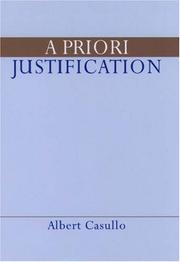| Listing 1 - 10 of 94 | << page >> |
Sort by
|
Book
Year: 1959 Publisher: Paris : PUF - Presses Universitaires de France,
Abstract | Keywords | Export | Availability | Bookmark
 Loading...
Loading...Choose an application
- Reference Manager
- EndNote
- RefWorks (Direct export to RefWorks)

ISBN: 0195115058 Year: 2003 Publisher: New York (N.Y.) Oxford university press
Abstract | Keywords | Export | Availability | Bookmark
 Loading...
Loading...Choose an application
- Reference Manager
- EndNote
- RefWorks (Direct export to RefWorks)
Book
ISBN: 9783897856622 Year: 2009 Publisher: Paderborn Mentis
Abstract | Keywords | Export | Availability | Bookmark
 Loading...
Loading...Choose an application
- Reference Manager
- EndNote
- RefWorks (Direct export to RefWorks)
Book
ISBN: 3969750938 Year: 2009 Publisher: Paderborn, Germany : Mentis,
Abstract | Keywords | Export | Availability | Bookmark
 Loading...
Loading...Choose an application
- Reference Manager
- EndNote
- RefWorks (Direct export to RefWorks)
Book
ISBN: 1351258826 1351258842 1351258834 Year: 2020 Publisher: New York, NY : Routledge,
Abstract | Keywords | Export | Availability | Bookmark
 Loading...
Loading...Choose an application
- Reference Manager
- EndNote
- RefWorks (Direct export to RefWorks)
Some of philosophy's biggest questions, both historically and today, are in-virtue-of questions: In virtue of what is an action right or wrong? In virtue of what am I the same person my mother bore? In virtue of what is an artwork beautiful? Philosophers attempt to answer many of these types of in-virtue-of questions, but philosophers are also increasingly focusing on what an in-virtue-of question is in the first place. Many assume, at least as a working hypothesis, that in-virtue-of questions involve a distinctively metaphysical kind of determinative explanation called ground. This Handbook surveys the state of the art on ground as well as its connections and applications to other topics. The central issues of ground are discussed in 37 chapters, all written exclusively for this volume by a wide range of leading experts. The chapters are organized into the following sections: I. History II. Explanation and Determination III. Logic and Structure IV. Connections V. Applications Introductions at the start of each section provide an overview of the section's contents, and a list of Related Topics at the end of each chapter points readers to other germane areas throughout the volume. The resulting volume is accessible enough for advanced students and informative enough for researchers. It is essential reading for anyone hoping to get clearer on what the biggest questions of philosophy are really asking.
Book
ISBN: 9780192871411 Year: 2023 Publisher: Oxford : Oxford University Press,
Abstract | Keywords | Export | Availability | Bookmark
 Loading...
Loading...Choose an application
- Reference Manager
- EndNote
- RefWorks (Direct export to RefWorks)
The Human A Priori is a collection of essays by A.W. Moore, one of them previously unpublished and the rest all revised. These essays are all concerned, more or less directly, with something ineliminably anthropocentric in our systematic pursuit of a priori sense-making. Part I deals with the nature, scope, and limits of a priori sense-making in general. Parts II, III, and IV deal with what are often thought to be the three great exemplars of the systematic pursuit of such sense-making: philosophy in the case of Part II, ethics in the case of Part III, and mathematics in the case of Part IV. Much of the attention throughout is devoted to the work of other philosophers: Kant and Wittgenstein feature prominently, and five of the essays take the form of reviews or critical notices of recent work in philosophy. But the interest in never purely exegetical. One of the lessons that emerges from the essays, either in opposition to the views of these other philosophers or by invocation of their views, is that we humans achieve nothing of real significance in philosophy, ethics, or mathematics except from a human point of view, and hence that all three of these pursuits can be said to betoken what may reasonably be called 'the human a priori'.
Book
ISBN: 9780199777860 Year: 2012 Publisher: Oxford Oxford university press
Abstract | Keywords | Export | Availability | Bookmark
 Loading...
Loading...Choose an application
- Reference Manager
- EndNote
- RefWorks (Direct export to RefWorks)
Book
Year: 1964 Volume: 35 Publisher: Meisenheim am Glan : A. Hain,
Abstract | Keywords | Export | Availability | Bookmark
 Loading...
Loading...Choose an application
- Reference Manager
- EndNote
- RefWorks (Direct export to RefWorks)
A priori --- Judgment. --- A priori --- Jugement --- Husserl, Edmund, --- Kant, Immanuel,
Book
ISBN: 1315730081 1317547861 9781317547860 9781317547853 1317547853 9781315730080 9781317547846 9781844652846 9781844652853 Year: 2011 Publisher: Durham : Acumen,
Abstract | Keywords | Export | Availability | Bookmark
 Loading...
Loading...Choose an application
- Reference Manager
- EndNote
- RefWorks (Direct export to RefWorks)
In recent years many influential philosophers have advocated that philosophy is an a priori science. Yet very few epistemology textbooks discuss a priori knowledge at any length, focusing instead on empirical knowledge and empirical justification. As a priori knowledge has moved centre stage, the literature remains either too technical or too out of date to make up a reasonable component of an undergraduate course. Edwin Mares book aims to rectify this. This book seeks to make accessible to students the standard topics and current debates within a priori knowledge, including necessity and cert
Book
ISBN: 377281834X Year: 1997 Publisher: Stuttgart Frommann-Holzboog
Abstract | Keywords | Export | Availability | Bookmark
 Loading...
Loading...Choose an application
- Reference Manager
- EndNote
- RefWorks (Direct export to RefWorks)
A priori --- History --- Kant, Immanuel
| Listing 1 - 10 of 94 | << page >> |
Sort by
|

 Search
Search Feedback
Feedback About UniCat
About UniCat  Help
Help News
News